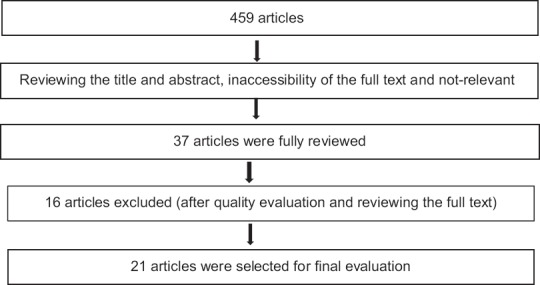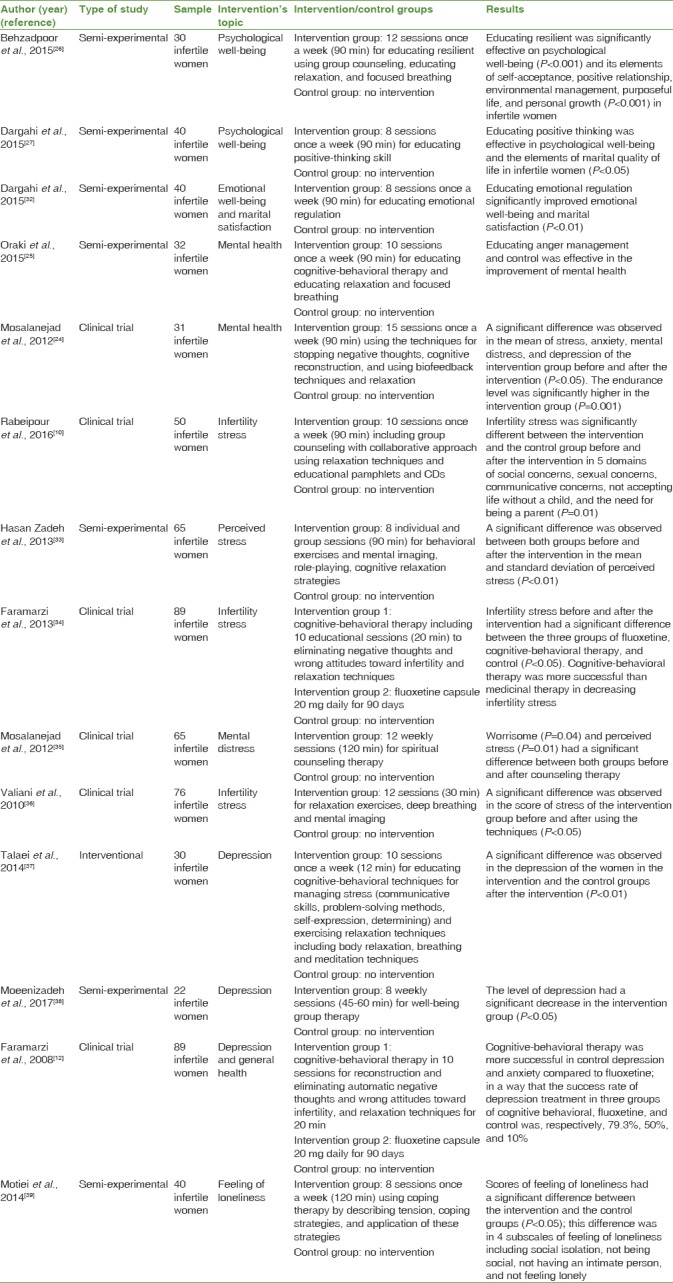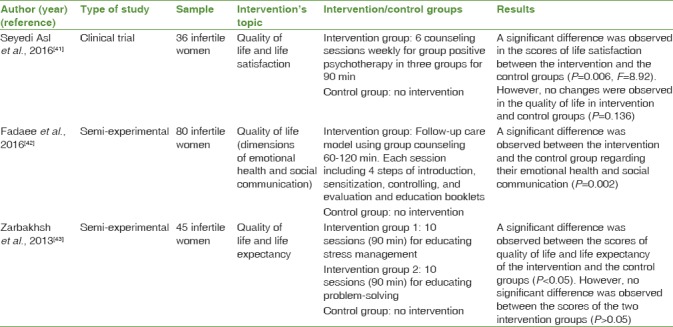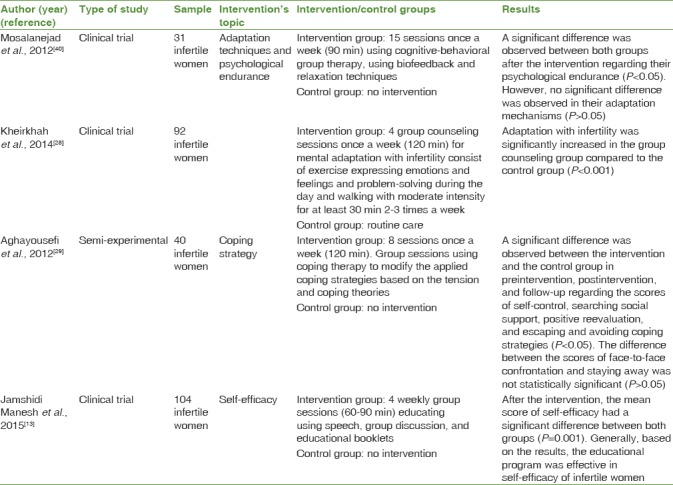Abstract
Infertility requires long-term care and treatments which would influence different aspects of health including the mental health of infertile women. The present study was conducted to determine strategies for psychological empowerment of infertile women. This systematic review was performed on previously conducted clinical trials. To achieve the intended studies, databases of Magiran, Scientific Information Database, Google Scholar, Scopus, PubMed, ProQuest, ScienceDirect, and Web of Science and also Iranian Registry of Clinical Trials website were searched using “infertility and infertile women” as the keywords. The inclusion criteria were being an interventional study and assessing the psychological status of infertile women. Performed studies in Iran with no time limitations were evaluated. Based on the Jadad criteria, studies with a score of 3 or more were enrolled in the systematic review. After assessing the quality of the studies, 21 studies were enrolled in the review for final evaluation. Reviewing the conducted studies showed that educational and counseling interventions could be effective in improving the aspects of psychological well-being of infertile women. Existing evidence revealed that applying coping strategies is effective in improving the quality of life in infertile women, which consequently lead to the improvement of psychological empowerment of infertile women.
Keywords: Empowerment, infertility, Iran, psychological status, systematic review
Introduction
Infertility is associated with numerous personal and social problems and has been proposed as a damaging factor to reproductive health.[1,2,3] Infertility affects 8%–12% of the couples of reproductive ages,[4] and about 15% of the couples would experience subfertility during the 1st year after their marriage;[5] while the total prevalence of fertility in Iran has been reported as 8%[6] and 13.2%.[1] Experiencing infertility is associated with a wide range of psychological problems such as stress, anxiety,[7,8,9,10,11] depression,[12] feeling humiliated, low self-esteem, feeling of inefficiency,[13] and lower psychological adaptation.[8,9,14] Hence, the necessity of psychological treatments for infertile women should be attended more.[15] Infertility would affect women's sense of well-being in both psychological and social domains. In some societies, infertility is considered as women's responsibility and infertile women would experience a feeling of guilt, negative imagination, and lowered self-esteem.[16,17] Infertility also affects sexual behaviors[18] and these women would experience a high rate of nonphysical domestic violence.[19] In fact, infertility and its treatment process is a mentally suffering source for infertile women that have destructive effects on their mental well-being;[20] infertile women have lower psychological well-being and higher psychological frustration compared to infertile men.[14] Hence, using strategies for psychological empowerment of infertile women to cope with these consequences is necessary.
Most of the empowerment models have been proposed for empowering women, especially the vulnerable groups.[21] Kabeer has mentioned psychological empowerment as one of the aspects of women's empowerment, which its application could be a factor for self-esteem, self-efficacy, and psychological health.[22] For moving toward development, especially in the field of empowered human resources, at first, individual's intellectual and attitudinal changes should be regarded.[23] In the field of increasing and improving the empowerment of infertile women, various studies have investigated the effects of educational and counseling method on the mental health,[24,25] psychological well-being,[26,27] mental adaptation,[28,29] and self-efficacy[13] in infertile women; so far, these studies in Iran have not been reviewed. Therefore, the present study was conducted to systematically review the performed studies on strategies for psychological empowerment of infertile women.
Methods
This systematic review was conducted on all interventional study in relation to the psychological conditions of infertile women in Iran until July 2017. The methods of presenting including determination of the study problem, data collection, analysis, and interpretation of the findings were performed based on the Preferred Reporting Items for Systematic reviews and Meta-Analyses (PRISMA) reporting system. To achieve the intended studies, published articles in national databases (Magiran, Scientific Information Database, and Iranian Registry of Clinical Trials) and international databases (Google Scholar, Scopus, PubMed, ProQuest, and ScienceDirect) were searched. No time limitation was set for search of resources. To comprehensiveness of the search, the keywords “infertility” and “infertile women” were used in the abstract, title, and keyword. In international sources, “Iran” in the affiliation or organizational affiliation was used in Advance Search option. The inclusion criteria for articles were being an interventional study and assessing the psychological status of infertile women in Iran. To increase the validity and reliability of the study, the articles were searched and the quality of the articles was also evaluated based on the Jadad criteria, separately by two researchers. Jadad scale is one of the most valid international scales for the evaluation of article's quality. Articles with a score of 3 or higher were enrolled in the study. Jadad scale or the Oxford quality scoring system contains three main phrases for controlling bias in clinical trial studies that would evaluate randomization, blinding, dropouts, and withdrawals from the study.[30] The total score of the scale based on these phrases is 5. A Jadad score of <3 indicates poor quality of the articles and a score of 3 or more indicates desirable quality of the article.[31] Eventually, 21 articles were enrolled in the study based on this scale. The procedure of the article selection is shown in Figure 1.
Figure 1.

The flowchart for article selection
Results
In the present systematic review, 21 articles with a sample size of 1127 participants in interventional studies were reviewed. Conducted studies in Iran in the field of mental-psychological empowerment or psychology of infertile women could be categorized into three main fields of psychological well-being and mental health, coping strategies, and quality of life [Tables 1–3].
Table 1.
Interventional studies on psychological status (psychological well-being and mental health) of infertile women

Table 3.
Interventional studies on psychological status (quality of life) of infertile women

Psychological well-being and mental health
Psychological well-being is a multidimensional concept. Psychological well-being is consisted of self-acceptance, positive relationship, autonomy, purposeful life, personal growth, and ability to manage the environment. The level of individual's psychological well-being could be assessed by measuring these factors.[44] Educational programs for improving individual's empowerment in coping with stressful situations in life could improve their psychological well-being.[26,27] In this regard, psychotherapy interventions for decreasing psychological problems with different approaches in infertile women have been approved because it is believed that these approaches are appropriately decreasing stress, anxiety,[10,33,35] and depression[45,38] and increasing psychological well-being,[26,32] which could improve the mental health and psychological well-being of infertile women [Table 1].
Coping strategies
Coping strategy is a rational way for confronting the anxieties of life, and the individual would manage requests beyond their ability. Coping strategies with stressful situations differ between people. Besides the stressful situations, the experienced level of tension by the individual depends on their coping strategies and understanding of these factors.[29,46,47] Hence, the topic of coping strategies in infertile women should be more attended. Although infertility as a source of psychological pressure could threaten the mental health of infertile women, the volume of its impact depends on women's coping skills. In this regard, counseling interventions and group therapies for psychological adaptation,[24,28] psychological endurance,[40] and efficacy[13] in these women have been investigated, which have been significantly effective as the factorial coping strategies for empowering infertile women [Table 2].
Table 2.
Interventional studies on psychological status (coping strategies) of infertile women

Quality of life
Infertility requires long-term strict treatments which could affect different aspects of quality of life.[42] Quality of life, as a scientific concept, is a sense of welfare which is caused by satisfaction or dissatisfaction with life. Improvement of quality of life is one of the most important goals of medical interventions,[48] so applying educational interventions based on the empowerment models for improving self-esteem could enhance the quality of life in women.[48,49,50] Improvement of quality of life in infertile women has been investigated in various studies using different educational theories and model[41,42] [Table 3].
Discussion
The present study is the first systematic review of interventional studies on psychological empowerment of infertile women in Iran. Results showed that educational and counseling interventions could be effective on the improvement of aspects of psychological well-being (intellectual–mental) in infertile women; to apply the results of these studies, it is necessary to perform studies with stronger methodology and long-term follow-up to increase the durability of their impact.
One of the important aspects of women's empowerment is psychological empowerment, which its implication would be a factor for self-esteem, self-efficacy, and psychological health.[22] The most important stage of empowerment is its starting point, which would be with attitudinal and intellectual changes.[23,51] The first practical strategy for empowerment programs is education. In the current era, information is the source of power, even the power itself; hence, achieving information is a key step toward the process of empowerment.[48,52] Various educational and counseling methods have been investigated for improving the psychological aspects of infertile women. Educating endurance, emotional regulation, positive thinking, and cognitive-behavioral counseling therapy and using relaxation techniques have been effective in improving psychological well-being and mental health such as stress,[10,25,35,36] anxiety, mental distress, and depression[37,38] caused by infertility. Results of the study by Faramarzi et al.[34,45] showed that using cognitive-behavioral therapy techniques has been more effective in controlling depression and anxiety than medicinal therapy (fluoxetine), which confirms the efficacy of these methods in improving psychological well-being and mental health. Furthermore, in conducted follow-ups, 4 weeks, 1 month, and 3 months after the intervention, these methods had more permanent effects.[32,34,45] Hence, it is necessary to perform studies for evaluating the long-term effectiveness of these methods in the psychological empowerment of women.
Besides psychological well-being, coping strategies are the rationale for confronting tensions in life.[46,47] Although infertility as a source of mental pressure could affect the health of infertile people, the depth of its impact depends on individual's coping skills. By presenting coping strategies to these women, the mental health of infertile women could be improved.[29] Endurance could be improved in infertile women through education, and it could help them cope with the stress of infertility.[26] On the other hand, self-efficacy as one of the methods for empowering infertile women would make them better understanding of their abilities in using psychological skills for controlling infertility-related emotions.[13,28,29]
Infertility is interacting with the social relationships and the needs of infertile women which could have destructive effects on the quality of their life.[42,53] Quality of life is a sense of welfare which is caused by satisfaction or dissatisfaction with life, and life crises could affect individual's welfare and pleasures in life.[41] Since one of the methods to modify the quality of life is using educational theories and models,[42] applying educational interventions based on empowerment models for improving self-esteem could improve the quality of life in infertile women; studies have indicated that education based on empowerment models could be effective in improving the quality of life in infertile women.[41,42]
Conclusions
Efforts toward psychological empowerment of infertile women in three main domains of “psychological well-being and mental health,” “coping strategies,” and “quality of life” are all effective in psychological empowerment of infertile women. Especially in societies where women are considered guilty of infertility and have to endure various psychological and social pressures, this matter is of significant importance.
Financial support and sponsorship
Shahid Beheshti Medical Science University, Tehran, Iran, supported the study.
Conflicts of interest
There are no conflicts of interest.
Acknowledgments
We would like to thank all the researchers who their studies have been used for this review. We would also thank the deputy of research and technology of the Shahid Beheshti University of Medical Sciences for providing access to the library, electronic resources, and databases.
References
- 1.Dirkavand-Moghaddam AD, Sayehmiri K. The prevalence of infertility in Iran, a systematic review. Iran J Obstet Gynecol Infertil. 2014;16:1–7. [Google Scholar]
- 2.Gdańska P, Drozdowicz-Jastrzębska E, Grzechocińska B, Radziwon-Zaleska M, Węgrzyn P, Wielgoś M, et al. Anxiety and depression in women undergoing infertility treatment. Ginekol Pol. 2017;88:109–12. doi: 10.5603/GP.a2017.0019. [DOI] [PubMed] [Google Scholar]
- 3.Mohammadi MR. Emotional and psychological problems of infertility and strategies to overcome them. Rep Infertil. 2001;2:33–9. [Google Scholar]
- 4.Inhorn MC, Patrizio P. Infertility around the globe: New thinking on gender, reproductive technologies and global movements in the 21st century. Hum Reprod Update. 2015;21:411–26. doi: 10.1093/humupd/dmv016. [DOI] [PubMed] [Google Scholar]
- 5.Steegers-Theunissen RP, Twigt J, Pestinger V, Sinclair KD. The periconceptional period, reproduction and long-term health of offspring: The importance of one-carbon metabolism. Hum Reprod Update. 2013;19:640–55. doi: 10.1093/humupd/dmt041. [DOI] [PubMed] [Google Scholar]
- 6.Safarinejad MR. Infertility among couples in a population-based study in Iran: Prevalence and associated risk factors. Int J Androl. 2008;31:303–14. doi: 10.1111/j.1365-2605.2007.00764.x. [DOI] [PubMed] [Google Scholar]
- 7.Masoumi SZ, Poorolajal J, Keramat A, Moosavi SA. Prevalence of depression among infertile couples in Iran: A Meta-analysis study. Iran J Public Health. 2013;42:458–66. [PMC free article] [PubMed] [Google Scholar]
- 8.Gameiro S, van den Belt-Dusebout AW, Bleiker E, Braat D, van Leeuwen FE, Verhaak CM, et al. Do children make you happier? Sustained child-wish and mental health in women 11-17 years after fertility treatment. Hum Reprod. 2014;29:2238–46. doi: 10.1093/humrep/deu178. [DOI] [PubMed] [Google Scholar]
- 9.Luk BH, Loke AY. The impact of infertility on the psychological well-being, marital relationships, sexual relationships, and quality of life of couples: A Systematic review. J Sex Marital Ther. 2015;41:610–25. doi: 10.1080/0092623X.2014.958789. [DOI] [PubMed] [Google Scholar]
- 10.Rabeipour S, Ordoni Avval Z, Arefi M, Behroozilak T. The effectiveness of group counseling by collaborative approaches on specific stress in infertile women. J Nurs Midwifery Urmia Univ Med Sci. 2016;14:56–65. [Google Scholar]
- 11.Hashemi S, Simbar M, Ramezani-Tehrani F, Shams J, Majd HA. Anxiety and success of in vitro fertilization. Eur J Obstet Gynecol Reprod Biol. 2012;164:60–4. doi: 10.1016/j.ejogrb.2012.05.032. [DOI] [PubMed] [Google Scholar]
- 12.Faramarzi M, Kheirkhah F, Esmaelzadeh S, Alipour A, Hjiahmadi M, Rahnama J, et al. Is psychotherapy a reliable alternative to pharmacotherapy to promote the mental health of infertile women? A randomized clinical trial. Eur J Obstet Gynecol Reprod Biol. 2008;141:49–53. doi: 10.1016/j.ejogrb.2008.07.012. [DOI] [PubMed] [Google Scholar]
- 13.Jamshidi Manesh M, Ali Manesh N, Reza Moghaddam Z, Haghani H. The effect of education on self-efficacy of infertile women. Payesh. 2015;14:227–37. [Google Scholar]
- 14.Besharat MA. Comparison of infertile women and men in terms of attachment style and psychological reconciliation with infertility. Psychol Educ Sci. 2003;33(2):1–15. [Google Scholar]
- 15.Zarif Golbar Yazdi H, Aghamohammadian Sharbaf H, Mousavifar N, Moeenizadeh M. The effectiveness of well-being therapy on stress, and psychological well-being in infertile women. Iran J Obstet Gynecol Infertil. 2012;15:48–55. [Google Scholar]
- 16.Alizadeh T, Farahani Najqi M, Shahravar M. Relationship between self-esteem and control source with stress in infertile women and men. J Reprod Infertil. 2005;6:194–204. [Google Scholar]
- 17.Etesami Pour R, Banihashemian K. Comparison of sex disorders and couple abuse among fertile and infertile women. Birjand Univ Med Sci. 2011;18:10–7. [Google Scholar]
- 18.Bokaie M, Simbar M, Yassini Ardekani SM. Sexual behavior of infertile women: A qualitative study. Iran J Reprod Med. 2015;13:645–56. [PMC free article] [PubMed] [Google Scholar]
- 19.Taebi M, Gandomani SJ, Nilforoushan P, GholamiDehaghi A. Association between infertility factors and non-physical partner abuse in infertile couples. Iran J Nurs Midwifery Res. 2016;21:368–71. doi: 10.4103/1735-9066.185577. [DOI] [PMC free article] [PubMed] [Google Scholar]
- 20.Hasanpoor-Azghdy SB, Simbar M, Vedadhir A. The emotional-psychological consequences of infertility among infertile women seeking treatment: Results of a qualitative study. Iran J Reprod Med. 2014;12:131–8. [PMC free article] [PubMed] [Google Scholar]
- 21.Longwe S. Oxford, England: Oxfam; 1991. Gender awareness: The missing element in the third world development project; pp. 149–57. [Google Scholar]
- 22.Kabeer N. Resources, agency, achievements: Reflections on the measurement of women's empowerment. Dev Change. 1999;30:435–64. [Google Scholar]
- 23.Riahi B. Human empowerment: A task or a necessity. J Dev Ind. 2006;27:10–6. [Google Scholar]
- 24.Mosalanejad L, Khodabakshi Koolaee A, Jamali S. Effect of cognitive behavioral therapy in mental health and hardiness of infertile women receiving assisted reproductive therapy (ART) Iran J Reprod Med. 2012;10:483–8. [PMC free article] [PubMed] [Google Scholar]
- 25.Oraki M, Vaziri Nasab B, Alipour A. The effectiveness of cognitive – Behavioral intervention for anger management on mental health for anger management on mental health of infertile women. Urmia Med J. 2015;26:652–62. [Google Scholar]
- 26.Behzadpoor S, Motahhari Zs, Vakili M, Sohrabi F. The Effect of resilience training on increasing psychological well-being of infertile women. J Ilam Univ Med Sci. 2015;23:131–42. [Google Scholar]
- 27.Dargahi S, Mohsenzade F, Zahrakar K. The effect of positive thinking training on psychological well-being and perceived quality of marital relationship on infertile women. Posit Psychol. 2015;1:45–58. [Google Scholar]
- 28.Kheirkhah M, Vahedi M, Jenani P. The effect of group counseling on infertility adjustment of infertile women in Tabriz al-Zahra clinic. Iran J Obstet Gynecol Infertil. 2014;17:7–14. [Google Scholar]
- 29.Aghayousefi A, Choobsaz F, Shaghaghi F, Motiei G. The effectiveness of coping teaching techniques on coping strategies in infertile women. J Kermanshah Univ Med Sci. 2012;2:155–64. [Google Scholar]
- 30.Jadad AR, Moore RA, Carroll D, Jenkinson C, Reynolds DJ, Gavaghan DJ, et al. Assessing the quality of reports of randomized clinical trials: Is blinding necessary? Control Clin Trials. 1996;17:1–2. doi: 10.1016/0197-2456(95)00134-4. [DOI] [PubMed] [Google Scholar]
- 31.Wang G, Mao B, Xiong ZY, Fan T, Chen XD, Wang L, et al. The quality of reporting of randomized controlled trials of traditional Chinese medicine: A survey of 13 randomly selected journals from mainland China. Clin Ther. 2007;29:1456–67. doi: 10.1016/j.clinthera.2007.07.023. [DOI] [PubMed] [Google Scholar]
- 32.Dargahi S, Zeraati M, Ghamari Givi H, Ayadi N, Haghanni M. The effectiveness of emotion regulation training on emotional well – Being and marital satisfaction of infertile women. Iran J Nurs. 2015;28:151–62. [Google Scholar]
- 33.Hasan Zadeh LifShagard M, Tarkhan M, Taghi Zadeh ME. Effectiveness of stress inoculation training on perceived stress in pregnant women with infertility. J Holist Nurs Midwifery. 2013;23:27–34. [Google Scholar]
- 34.Faramarzi M, Pasha H, Esmailzadeh S, Kheirkhah F, Heidary S, Afshar Z, et al. The effect of the cognitive behavioral therapy and pharmacotherapy on infertility stress: A randomized controlled trial. Int J Fertil Steril. 2013;7:199–206. [PMC free article] [PubMed] [Google Scholar]
- 35.Mosalanejad L, Khodabakshi Koolee A. Looking at infertility treatment through the lens of the meaning of life: The effect of group logotherapy on psychological distress in infertile women. Int J Fertil Steril. 2013;6:224–31. [PMC free article] [PubMed] [Google Scholar]
- 36.Valiani M, Abediyan S, Ahmadi SM, Pahlavanzadeh S, Hassanzadeh A. The effect of relaxation techniques to ease the stress in infertile women. Iran J Nurs Midwifery Res. 2010;15:259–64. [PMC free article] [PubMed] [Google Scholar]
- 37.Talaei A, Kimiaei, S, Borhani Moghani M, Moharreri F, Talaei A, Khanghaei R. Effectiveness of group cognitive behavioral therapy on depression in infertile women. Iran J Obstet Gynecol Infertil. 2014;17:1–9. [Google Scholar]
- 38.Moeenizadeh M, Zarif H. The efficacy of well-being therapy for depression in infertile women. Int J Fertil Steril. 2017;10:363–70. doi: 10.22074/ijfs.2016.5087. [DOI] [PMC free article] [PubMed] [Google Scholar]
- 39.Motiei G, Aghayousefi A, Choobsaz F, Shaghaghi F. Effective of confrontation therapy on the feeling of lonlyness in infertile women. J Appl Psychol. 2014;3(19):85–98. [Google Scholar]
- 40.Mosalanejad L, Khodabakshi Koolaee A, Jamali S. Effect of group cognitive behavioral therapy on hardiness and coping strategies among infertile women receiving assisted reproductive therapy. Iran J Psychiatry Behav Sci. 2012;6:16–22. [PMC free article] [PubMed] [Google Scholar]
- 41.Seyedi Asl ST, Sadeghi K, Bakhtiari M, Ahmadi SM, Nazari Anamagh A, Khayatan T, et al. Effect of group positive psychotherapy on improvement of life satisfaction and the quality of life in infertile woman. Int J Fertil Steril. 2016;10:105–12. doi: 10.22074/ijfs.2016.4775. [DOI] [PMC free article] [PubMed] [Google Scholar]
- 42.Fadaee M, Rahimi Kian F, Damghanian M, Shahrokhnezad Tehrani A, Mehran A. Effect of continuous care model on emotional health and social connection aspects of quality of life of infertile women. J Clin Nurs Midwifery. 2016;5:52–63. [Google Scholar]
- 43.Zarbakhsh M, Shoahasani Z, Zahiri Z, Hafshjani F, Khademi M. Effects of stress management training and problem solving on quality of life and life expectancy among infertile women. Pajouhan Sci J. 2013;11:1–10. [Google Scholar]
- 44.Kamp Dush CM, Taylor MG, Kroeger RA. Marital happiness and psychological well-being across the life course. Fam Relat. 2008;57:211–26. doi: 10.1111/j.1741-3729.2008.00495.x. [DOI] [PMC free article] [PubMed] [Google Scholar]
- 45.Faramarzi M, Alipor A, Esmaelzadeh S, Kheirkhah F, Poladi K, Pash H, et al. Treatment of depression and anxiety in infertile women: Cognitive behavioral therapy versus fluoxetine. J Affect Disord. 2008;108:159–64. doi: 10.1016/j.jad.2007.09.002. [DOI] [PubMed] [Google Scholar]
- 46.Reza AY. 1st ed. Tehran: Shahryar Express; 1999. Introducing of Newest Ways for Psychotherapy (Persian) [Google Scholar]
- 47.Wang J, Patten SB. The moderating effects of coping strategies on major depression in the general population. Can J Psychiatry. 2002;47:167–73. doi: 10.1177/070674370204700207. [DOI] [PubMed] [Google Scholar]
- 48.Karimy M, Aminshokravi F, Zareban E, Koohpayezadeh J, Baradaran H, Khoshdel A. The effect of education based on individual empowerment model on the quality of life in the menopause women in Zarandieh. Sci Mag Yafte. 2014;16:80–90. [Google Scholar]
- 49.Salahi S, Javanbakhtian R, Hasheminia A, Habibzadeh H. The effect of family-centered empowerment model on quality of life of hemodialysis patients. J Nurs Midwifery Urmia Univ Med Sci. 2012;10:1. [Google Scholar]
- 50.Rasouli D, Mohammadpour Y, Safaie Z, Jafarizadeh H. The effect of two methods of self-empowerment training program on quality of life of diabetic patients attending the diabetes clinic in Urmia University of Medical Sciences, 2013. J Nurs Midwifery Urmia Univ Med Sci. 2016;14:389–96. [Google Scholar]
- 51.Charmchian Langerodi M, Alibaygi A. An investigation of effective factors on rural women's psychological empowerment in sari. Women Soc. 2013;4:165–92. [Google Scholar]
- 52.Heidari M, Alhani F, Kazemnejad AF. The effect of empowerment model on quality of life of diabetic adolescents. Iran J Pediatr. 2007;17:88–96. [Google Scholar]
- 53.Hasanpoor-Azghdy SB, Simbar M, Vedadhir A. The social consequences of infertility among Iranian women: A Qualitative study. Int J Fertil Steril. 2015;8:409–20. doi: 10.22074/ijfs.2015.4181. [DOI] [PMC free article] [PubMed] [Google Scholar]


